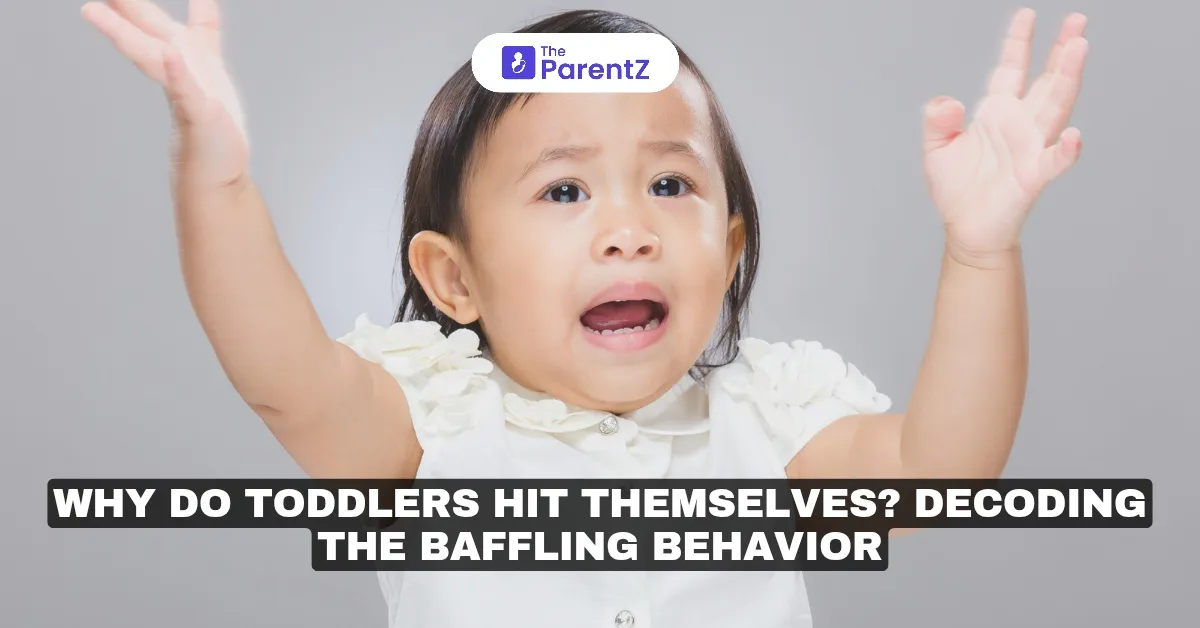As a parent, watching your toddler hit themselves can be distressing. Whether they're banging their head against the wall, slapping their face, or hitting their legs, this behavior often leaves parents worried and confused. Let's break down the reasons behind this common behavior and learn how to handle it effectively.
Developmental Stage
During toddlerhood, children are navigating a world filled with new experiences, emotions, and frustrations. They are learning to communicate their needs but often lack the vocabulary or emotional regulation skills to express themselves adequately. This inability can lead to feelings of frustration or overwhelm, which may manifest as self-hitting or other self-injurious behaviors.
Common Reasons for Self-Hitting in Toddlers
It's important to remember that there's rarely one single reason why a toddler hits themselves. It's usually a combination of factors. Here are some of the most common culprits:
- Frustration and Emotional Regulation: Think about the last time you felt incredibly frustrated but couldn't express it in words. That's exactly what your toddler experiences daily! Their developing brain hasn't yet mastered emotional regulation, and they have limited language skills to express complex feelings. Self-hitting often becomes their way of dealing with overwhelming emotions like anger, frustration, or disappointment.
- Sensory Exploration and Development: Surprisingly, some toddlers hit themselves simply because they're exploring their bodies and the sensations they can create. It's similar to how they touch different textures or put things in their mouth – they're learning about cause and effect and how their body responds to different actions.
- Communication Attempts: When words fail them (which happens often at this age), some toddlers resort to physical actions to communicate their needs. The hitting might be their way of saying, "I'm tired," "I'm hungry," or "I need attention."
- Pain or Discomfort: Sometimes, self-hitting can indicate physical discomfort. Your toddler might hit their ear during an ear infection or bang their head when teething. They're trying to cope with the discomfort in the only way they know how.
- Imitation: Children learn by observing and imitating. If they've witnessed another child hitting themselves, they might mimic the behavior. This doesn't necessarily mean they understand the reason behind the action; they're simply copying what they've seen.
When to Be Concerned?
While self-hitting is often a normal part of development, there are times when it might signal something that needs professional attention:
Research suggests that occasional self-hitting is common in toddlers aged 18 months to 3 years. However, if the behavior persists beyond age 4 or becomes more intense over time, it's worth discussing with your pediatrician.
Red Flags to Watch For:
- The hitting is forceful enough to cause injury.
- Your child seems unable to feel pain.
- The behavior occurs frequently throughout the day.
- It's accompanied by significant developmental delays.
- Your child shows limited interest in social interaction.
- The hitting interferes with daily activities or learning.
How Can Parents Help?
Stay Calm and Present: Your reaction matters enormously. When you remain calm, you're teaching your toddler that big emotions are manageable. Take a deep breath and remember that this is typically a phase.
Provide Alternative Coping Strategies: Help your toddler channel their energy into safer activities. When you see them starting to hit themselves, you might:
- Offer a soft pillow to punch.
- Suggest jumping up and down.
- Guide them through taking deep breaths (make it fun by pretending to blow out birthday candles)
- Provide a stress ball or sensory toy.
Name Their Emotions: Help them develop emotional awareness by naming what they might be feeling: "I see you're feeling frustrated because you can't open the toy. That's really hard, isn't it?" This validates their feelings while building their emotional vocabulary.
Create a Calming Environment: Sometimes, self-hitting can be triggered by overstimulation. Try creating a quiet, cozy corner in your home where your toddler can go to calm down. Fill it with soft items, books, and calming activities.
When to Seek Professional Help?
If you're worried about your child's self-hitting behavior, trust your parental instinct. Consult your pediatrician if:
- The behavior causes injuries
- It significantly impacts daily life
- Your child shows other concerning behaviors
- You're feeling overwhelmed and need support
Remember that seeking help isn't a sign of failure – it's a sign of great parenting. Your pediatrician can evaluate whether the behavior is age-appropriate or if further assessment is needed.
The Good News
Most toddlers naturally outgrow self-hitting as they develop better communication skills and emotional regulation. Your consistent, loving support during this phase helps them learn healthier ways to express themselves. By staying patient and implementing positive strategies, you're helping your baby develop crucial emotional and social skills that will serve them well throughout life.
Conclusion
While witnessing your toddler hit themselves can be distressing, understanding the underlying reasons can help you respond more effectively and compassionately. Remember that this behavior is often part of normal development as children navigate their emotions and learn how to communicate them. With patience and support, you can guide your child through these challenging moments while fostering healthy emotional expression as they grow.





Be the first one to comment on this story.